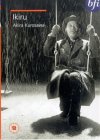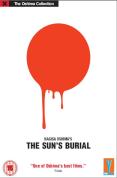![Seven Samurai [1954]](/pictures/1004703.jpg) Seven Samurai | DVD | (22/11/1999)
from £14.98
| Saving you £5.01 (33.44%)
| RRP
Seven Samurai | DVD | (22/11/1999)
from £14.98
| Saving you £5.01 (33.44%)
| RRP Unanimously hailed as one of the greatest masterpieces in the history of the motion picture, Seven Samurai has inspired countless films modelled after its basic premise. But Akira Kurosawa's classic 1954 action drama has never been surpassed in terms of sheer power of emotion, kinetic energy, and dynamic character development. The story is set in the 1600s, when the residents of a small Japanese village are seeking protection against repeated attacks by a band of marauding thieves. Offering mere handfuls of rice as payment, they hire seven unemployed "ronin" (masterless samurai), including a boastful swordsman (Toshiro Mifune) who is actually a farmer's son desperately seeking glory and acceptance. The samurai get acquainted with but remain distant from the villagers, knowing that their assignment may prove to be fatal. The climactic battle with the raiding thieves remains one of the most breathtaking sequences ever filmed. It's poetry in hyperactive motion and one of Kurosawa's crowning cinematic achievements. This is not a film that can be well served by any synopsis; it must be seen to be appreciated and belongs on the short list of any definitive home-video library. --Jeff Shannon
 Ikiru | DVD | (06/10/2003)
from £18.75
| Saving you £1.24 (6.61%)
| RRP
Ikiru | DVD | (06/10/2003)
from £18.75
| Saving you £1.24 (6.61%)
| RRP ""Sometimes I think of my death "" wrote Akira Kurosawa ""I think of ceasing to be... and it is from these thoughts that Ikiru came."" The story of a man diagnosed with stomach cancer Kurosawa's film is a serious contemplation of the nature of existence and the question of how we find meaning in our lives. Opening with a shot of an x-ray showing the main character's stomach 'Ikiru' tells the tale of a dedicated downtrodden civil servant who diagnosed with a fatal cancer learns to c
 The Sun's Burial | DVD | (26/05/2008)
from £N/A
| Saving you £N/A (N/A%)
| RRP
The Sun's Burial | DVD | (26/05/2008)
from £N/A
| Saving you £N/A (N/A%)
| RRP Set in the post-war slums of Osaka The Sun's Burial follows the lives and fates of the denizens of this hellish ghetto. Pimps prostitutes drug addicts vagrants hustlers and gangsters struggle to survive amidst the poverty and decay of 1950's Japan. Unflinching in it's portrayal of life in these slums the film goes beyond a documentary-style realism to achieve a garish lurid Cinemascope aesthetic that is at once repulsive and yet mesmerising. It's a pitiless and dispassionate portrait of a living hell that lurks behind the facade of a prosperous new Japan a place where everything - food sex even blood - is simply a commodity to be stolen and sold.

Please wait. Loading...
This site uses cookies.
More details in our privacy policy